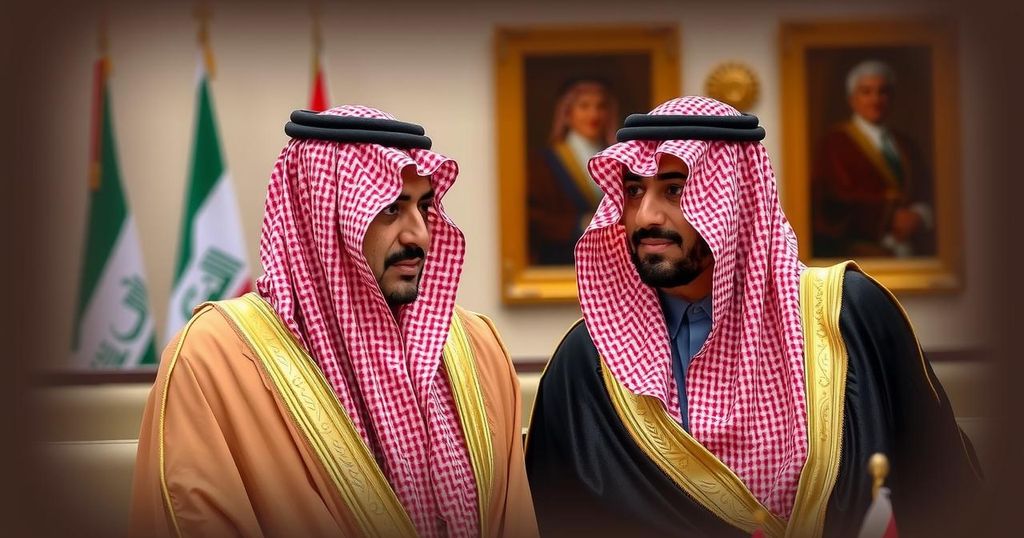Saudi Arabia Advocates for Sanctions Relief on Syria in Diplomatic Talks

Saudi Arabia is advocating for the lifting of sanctions on Syria during talks with West Asian and European diplomats. The discussions, held in Riyadh, aim to support the war-ravaged nation following recent leadership changes. Key officials stress the necessity for humanitarian aid and a potential easing of sanctions tied to reforms by Syria’s new leadership.
On January 13, 2025, Saudi Arabia engaged in discussions with diplomats from West Asia and Europe in Riyadh, advocating for the removal of sanctions imposed on Syria. Saudi Foreign Minister Prince Faisal bin Farhan emphasized that the continued existence of these sanctions stifles the Syrian people’s aspirations for reconstruction and development. The talks included participants from several nations and organizations, signaling Saudi Arabia’s intention to enhance its influence and support the war-torn nation following the recent regime change led by Islamist factions.
The diplomatic dialogue highlighted Saudi Arabia’s shift in stance, as the kingdom previously severed ties with Bashar al-Assad’s regime in 2012. However, amid developments in Syria, Riyadh has begun taking a more active role by hosting talks focused on potential solutions for the humanitarian crisis. Prince Faisal noted, “We also emphasized the importance of continuing to provide various forms of humanitarian and economic support….”
Significant discussions included a potential easing of sanctions by the European Union contingent on the formation of a more inclusive Syrian government. Kaja Kallas, the EU’s top diplomat, indicated that the bloc might reconsider its stance if the new Syrian leadership demonstrates a commitment to protecting minority rights and fostering unity within the country.
Moreover, Germany has expressed its intention to maintain sanctions against individuals responsible for crimes during the civil war while simultaneously enhancing assistance to civilians in need. With approximately 70% of Syrians requiring humanitarian aid, the urgency for actionable support is evident.
In light of these events, Saudi Arabia is also exploring avenues for long-term recovery assistance in Syria. This aligns with its recent efforts to provide immediate humanitarian aid, aiming to restore stability and facilitate the safe return of refugees, as articulated by Prince Faisal.
As multiple countries gauge the direction of Syria’s new administration, questions remain regarding the extent of Saudi Arabia’s commitment and resources to support this initiative amidst remaining sanctions. The success of future endeavors will largely depend on the ability of Syrian leaders to navigate the complex landscape of reconstruction while addressing the international community’s concerns.
Overall, the developments in the diplomatic talks signify a pivotal moment for Saudi Arabia as it seeks to balance its foreign policy objectives with humanitarian imperatives in the context of Syria’s ongoing recovery efforts.
The article underscores recent diplomatic initiatives by Saudi Arabia to advocate for the lifting of sanctions against Syria as the nation contends with the aftermath of a prolonged civil war. Following the rise of a new leadership structure following the ousting of Bashar al-Assad, regional and global powers are reassessing their stances regarding the humanitarian situation in Syria. The complexities of international sanctions, the call for an inclusive government, and ongoing humanitarian needs form the backdrop against which these discussions unfold.
In conclusion, Saudi Arabia’s recent diplomatic engagements highlight a significant shift in its approach towards Syria, as the kingdom seeks to leverage its influence to facilitate recovery and reconciliation efforts. The discussions revolving around sanctions relief and humanitarian aid reflect both an acknowledgment of the dire needs of the Syrian populace and a strategic recalibration of regional politics in the aftermath of the Assad regime’s downfall. Ultimately, the path forward will depend on the new leadership’s responsiveness to calls for reform and cooperation with the international community.
Original Source: www.thehindu.com








